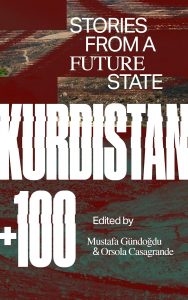Niall Harrison Reviews Kurdistan + 100 edited by Mustafa Gündoğdu & Orsola Casagrande
 Kurdistan + 100 , Mustafa Gündoğdu & Orsola Casagrande, eds. (Comma Press 978-1-91269-736-6, £10.99, 237pp, tp). November 2023. Cover by David Eckersall.
Kurdistan + 100 , Mustafa Gündoğdu & Orsola Casagrande, eds. (Comma Press 978-1-91269-736-6, £10.99, 237pp, tp). November 2023. Cover by David Eckersall.
When you finish reading the last page of the last story in this strong anthology of strong stories, you are not yet done with the book. There is an afterword by editors Mustafa Gündoğdu and Orsola Casagrande, which probably was not part of the original concept. It is sobering. The editors describe the changing circumstances and challenges facing Kurds during the period in which Kurdistan + 100 was being assembled: the killing of Jina (Mahsa) Amini by the Iranian “morality police” and the protests that followed; the blocking of aid to Kurdish regions by Recep Tayyip Erdoğan and Bashar al-Assad following the February 2023 earthquake; and most wrenching, the “contagious excitement” that spread across the four geographical regions that would make up Kurdistan – the regions that are currently southeastern Turkey, northern Iraq, northwestern Iran, and northern Syria – before the May 2023 Turkish elections, and the despair that followed Erdoğan’s victory. One of the included authors is now living in exile in Germany, her story for the collection having been cited as evidence of “terrorism propaganda” in a trial in Turkey; another is in prison; a third has been displaced from her home in Syria by military conflict. The afterword is a stark counterpoint to the editors’ more hopeful introduction, which, while hardly Pollyannaish, spends substantial time on the achievements of Kurdish politics – such as the establishment of “democratic autonomy” in Rojava, in defiance of the Syrian civil war – en route to justifying the anthology’s premise, which is to imagine Kurdish futures in 2046, a century after the high watermark of Kurdish self-determination, the eleven-month existence of the independent Kurdish Republic of Mahabad. To imagine a state for one of the largest stateless populations in the world is a grand thought experiment, says the introduction; it is also a real political project, with real consequences, says the afterword.
It is also a type of project that the anthology’s publisher, Comma Press, has undertaken before. Kurdistan + 100 follows two other “Futures Past” anthologies, Iraq + 100 (2016) and Palestine + 100 (2019); Egypt + 100 is forthcoming. All of these SWANA anthologies – I am deliberately preferring the geographical term, Southwest Asian and North African, to the Eurocentric designation “Middle Eastern” or the cultural/linguistic designation “Arab” – are conceived as interventions. They are intended to help concretise dreams that are not just usually excluded from science fiction, but undermined or actively suppressed in the real world by the states where the majority of science fiction is published. As with the many other recent anthologies that might be inelegantly grouped into a broader category of “cultural showcase,” the Futures Past anthologies are careful to disclaim their scope. Gündoğdu and Casagrande note the impossibility of fully representing four territories, five dialects, numerous sub-dialects, and the recombinations of all these across the Kurdish diaspora; of the thirteen stories, five are translated from Kurdish dialects (four Kurmanji, one Sorani), five are translated from Turkish, and three were composed in English. But unlike those other anthologies, Kurdistan + 100 is at the same time clear that it aims to speak for, and “find unity in”, a single cause.
That does not mean the stories speak with a single voice. On the straightforwardly optimistic side, there are stories like Selahattın Demırtaş’s “My Handsome One” (translated from Turkish by Amy Spangler), in which the narrator recounts their life story, from growing up in a context in which “War was something natural, like rain, or the wind,” to becoming a freedom fighter after what is essentially a second Arab Spring, to ultimately becoming the second woman elected as Kurdistan’s president, leading the country into a Middle East Democratic Union modelled after the EU “only more durable, based on welfare rather than trade.” The story is a short piece that is structured to inspire belief in its imagined future history, the episodes from the narrator’s life briskly described; it fully achieves its goal, with some memorable images along the way. The narrator’s walk through an Aleppo that is rebuilt and shining, the ghosts of war very nearly exorcised, is uplifting. Similarly positive, albeit more modest in its timeframe, is “Rising Like Water” by Ömer Dilsoz (translated from Kurmanji by Rojin Shekh-Hamo). A group of friends – a prototypical example of Margaret Mead’s “small group of thoughtful, committed citizens” – discuss political and philosophical questions on their regular caving trips, critiquing the historical successes and failures of Kurdish politics. They set out to change Kurdish society and instil a greater belief that Kurds can be leaders: they succeed in this much by 2046, but Kurdistan does not become a political reality for a further century.
On the flipside, Jîl Şwanî’s “The Wishing Star” is equally powerful, but bleak, and a denunciation of the global community that gives short shrift to Kurdish aspirations. A journalist travels into Kurdistan, despite warnings that people don’t come back, or come back frantic and speaking an incomprehensible language: It may be ego driving him, more than morality. What he finds is a denuded landscape and scattered villages, subject to regular raids. Many have died, and those who are left have had their tongues cut out. What unity they have comes from music: Around the fire, they hum the song that lends the story its title. After some months, the journalist gets out. He writes his book, it is acclaimed, politicians talk; and the last line of the story is “In the end, nothing changed.” Sema Kaygusuz’s “Waiting for the Leopard” (translated from Turkish by Nicholas Glastonbury), which may be the anthology’s standout, occupies similarly haunting terrain. The protagonist is the Leopard Warden, one of 150 Wardens charged with locating evidence that their named species still exists in a sparingly but effectively evoked Kurdistan, a place of “thirst-chapped earth” ruined by military bombardment and environmental desecration. One day he uncovers a mass grave; from that grave he takes a tooth; and from that tooth is grown a hybrid sibling to be his companion and helper. She died in 1938, and while she is initially (deliberately) recreated with historical amnesia, memories start to break through. The story’s end harshly caveats this hopeful seed: Repression may not hold, but the sacrifices required to overcome it may be mortal.
Just from these four stories, you get a sense of some of the recurring motifs. There are stories with conventional SF furniture – lunar hotels, meals in pill form, robots and AIs – as in “The Last Hope” by Qadir Agid (translated from Kurmanji by Kate Ferguson and Dîbar Çelik), in which the founder of the Republic of Mahabad is reincarnated in 2046 to find an established and high-tech but quarrelling Kurdistan. But the features that loom largest speak to a vision of Kurdish culture more than to technology. Perhaps unsurprisingly, given the fractured landscape described by the editors, language is frequently important, as in “The Wishing Star”, or as in Nariman Evdike’s “The Letter” (translated from Kurmanji by Rojin Shekh-Hamo), a tale that felt slightly rushed to me, in which a daughter returns to Kurdistan after her mother’s death, seeking the truth about a letter which she herself cannot read. Music recurs as an alternative vehicle for communication, communion, and memory, as in the atmospheric “The Age of the Iron Locusts” by Yıldız Çakar (translated from Kurmanji by Harriet Paintin), in which a radio capable of tuning into different realities provides inspiration and lifeline. And perhaps most significantly, there is a consistent thread of love and care for Kurdistan’s landscape, the mountains and oak trees and farmland that in many of the stories is as much at risk as the people who inhabit it.
The most explicit statement that Kurdish politics are climate politics comes in “Cleaners of the World” by Huseyin Karabey (translated from Turkish by Mustafa Gündoğdu), which imagines, perhaps a little intrusively, a future Greta Thunberg who comes to see Kurdish liberation as the keystone to global liberation. But it is there in almost every story to a greater or lesser extent. In Ava Homa’s “Friends Beyond the Mountains”, the primary SF invention is the publication of a kind of psychohistorical analysis that mathematically proves state repression is inefficient as well as cruel, and thus contributes to a revolutionary political moment in Iran; but there are also artificial weather systems to bring order to a ravaged environ ment, and the narrator laments that she has never known what real seasons feel like. And in “Arsela” by Meral Şimşek, not only are out-of-joint seasons part of what leave “your sense of belonging broken,” but the land itself, the mountains of Kurdistan, provides the gift that enables the story’s ending, a rare mineral that means the country can become self-sufficient in the production of key pharmaceuticals. “Arsela” is the story the Turkish legal system claimed as terrorist propaganda, which seems rather a reach to me, but what it does demonstrate, like the anthology as a whole, is that irrespective of its political status, the idea of Kurdistan is already and will continue to be rich and vital. There is unity to be found in the cause. The questions of how much SF can, does, or should seek to influence reality are eternal and vexed but an anthology like Kurdistan + 100 makes you hope that in the end, something might change.
In Niall Harrison‘s spare time, he writes reviews and essays about sf. He is a former editor of Vector (2006-2010) and Strange Horizons (2010-2017), as well as a former Arthur C. Clarke Award judge and various other things.
This review and more like it in the April 2024 issue of Locus.
 While you are here, please take a moment to support Locus with a one-time or recurring donation. We rely on reader donations to keep the magazine and site going, and would like to keep the site paywall free, but WE NEED YOUR FINANCIAL SUPPORT to continue quality coverage of the science fiction and fantasy field.
While you are here, please take a moment to support Locus with a one-time or recurring donation. We rely on reader donations to keep the magazine and site going, and would like to keep the site paywall free, but WE NEED YOUR FINANCIAL SUPPORT to continue quality coverage of the science fiction and fantasy field.
©Locus Magazine. Copyrighted material may not be republished without permission of LSFF.






